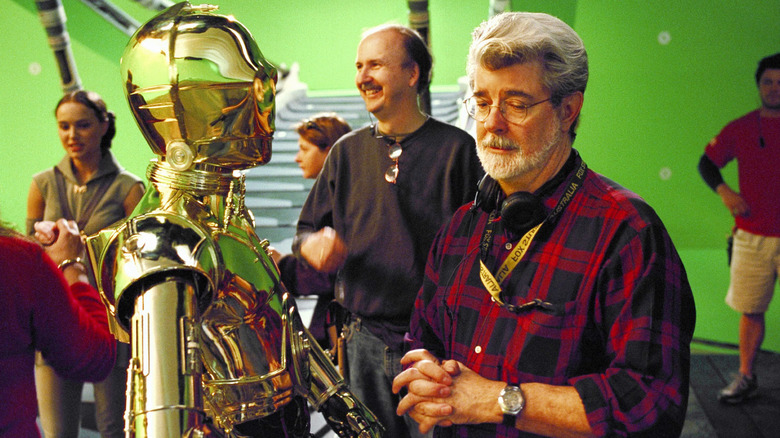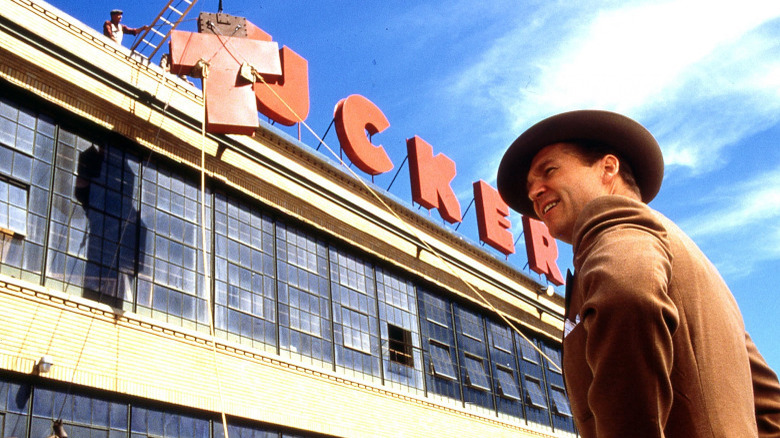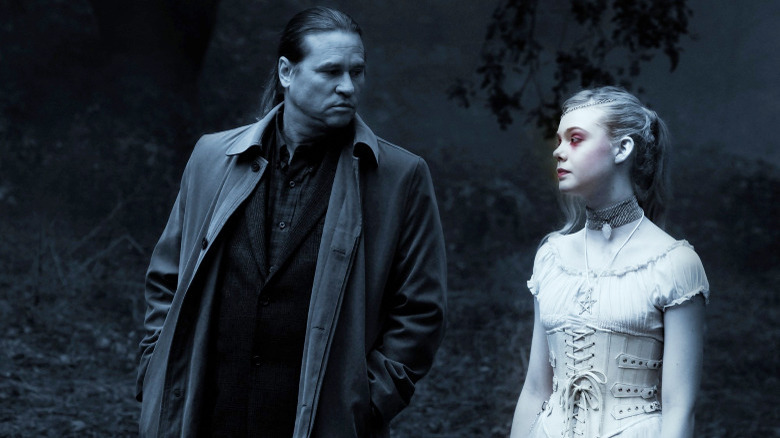Why Francis Ford Coppola Felt Sad About George Lucas' Star Wars Success
"The Godfather" and "Apocalypse Now" director Francis Ford Coppola has never been one to follow the beaten path. A key figure in the American New Wave, Coppola teamed up with George Lucas early on in their careers to co-found what's now known as American Zoetrope. It was a privately-run production company meant to specialize in less conventional films, starting with Coppola's 1969 drama "The Rain People." Zoetrope also backed Lucas' first two movies as a director: The avant-garde 1971 dystopian sci-fi film "THX-1138" and 1973's "American Graffiti," a '60s-set teen dramedy that helped establish the template for the modern hangout film.
Four years after "American Graffiti", Lucas teamed up with 20th Century Fox Studios to make the first "Star Wars" movie. It was, as all you readers out there know, a smash-hit that had a huge impact on pop culture and would forever alter the course of Lucas' career as a filmmaker. Indeed, Lucas has only directed three movies since then — the three films in the "Star Wars" prequel trilogy — and spent decades building out a galaxy far, far away before he sold the property to Disney in 2012.
For Coppola, however, his friend's success with the "Star Wars" franchise has always been a mixed blessing. As he explained to Vulture in 2020:
"Well, [Lucas] created something ['Star Wars'] that brought joy and happiness and pleasure — and even some wisdom — to so many people. Whatever benefits he got from it, he deserved and is welcome to. If I feel sadness, it is that he didn't make the other movies he was going to make. George is truly a brilliant, talented person. Just look at 'American Graffiti' and see all the innovation. We should've had more."
Coppola and Lucas' Careers Weren't So Different For a While
It's true that Lucas' commitment to the worlds of "Star Wars" pulled him away from other movies as a director. In fact, it was partly because of "Star Wars" that Lucas had to pass on helming "Apocalypse Now," with Coppola taking his place. Even so, when you look at Lucas and Coppola's careers in the '80s and '90s, they're not as different as you might expect.
Yes, Lucas didn't direct any more films until "The Phantom Menace" in 1999 and mostly worked on "Star Wars" projects during this period, as well as the "Indiana Jones" franchise. But at the same time, he also co-wrote and/or executive produced an eclectic mix of films, including Paul Schrader's "Mishima: A Life in Four Chapters," Jim Henson's "Labyrinth," Ron Howard's "Willow," and Don Bluth's "The Land Before Time." Even when he backed weird and off-putting misfires like "Howard the Duck" and "Radioland Murders," Lucas was at least trying to change things up.
The same could be said for Coppola. As with Lucas, these decades saw Coppola suffer some career lows (1996's "Jack") and revisit his '70s output (1990's "The Godfather Part III"). Yet, he also helmed some truly audacious movies in terms of their style ("Rumble Fish," "Bram Stoker's Dracula"), and even reunited with Lucas to make the 3D short film "Captain EO" in 1986. Then, two years later, they re-teamed for a vey different movie in the form of "Tucker: The Man and His Dream," with Lucas once again producing and Coppola calling the shots.
Lucas is Done Experimenting (But Coppola Isn't)
After completing the "Star Wars" prequel trilogy, Lucas used his clout and even his own money to produce his long-in-the-making passion project "Red Tails" (a 2012 movie about the Tuskegee Airmen that Lucas first conceived in 1988), and co-wrote the bizarre but fascinating animated jukebox musical "Strange Magic." That aside, though, his focus was on "Star Wars" and "Indiana Jones"-related ventures for most of the 2000s prior to his semi-retirement from filmmaking and decision to sell Lucasfilm in 2012.
Coppola, on the other hand, has so far spent the 21st century directing low-budget arthouse movies like "Youth Without Youth" and "Twixt." (Well, that and overseeing non-film ventures, like his winery.) He's even gearing up to finally shoot and self-finance "Megalopolis," an ambitious movie he's dreamed about making since the '80s. Still, as much as Coppola remains passionate about experimenting with cinema as an art form, he seems to have made his peace with the fact that Lucas spent so much of his career working on the "Star Wars" franchise — or, rather, as Coppola told Vulture, "I'm at the point where I can't bring it up anymore. I do sort of think of [Lucas] as a kid brother."
Completing that thought, Coppola noted, "We older people have to celebrate the success [of younger people]." As he pointed out, the public tends to be "more interested" in what his daughter, "Lost in Translation" and "On the Rocks" director Sofia Coppola, is doing than what he and Lucas are up to nowadays. (Sofia Coppola also co-owns American Zoetrope with her brother and fellow filmmaker Roman Coppola now.) "That's how it should be," he added.


